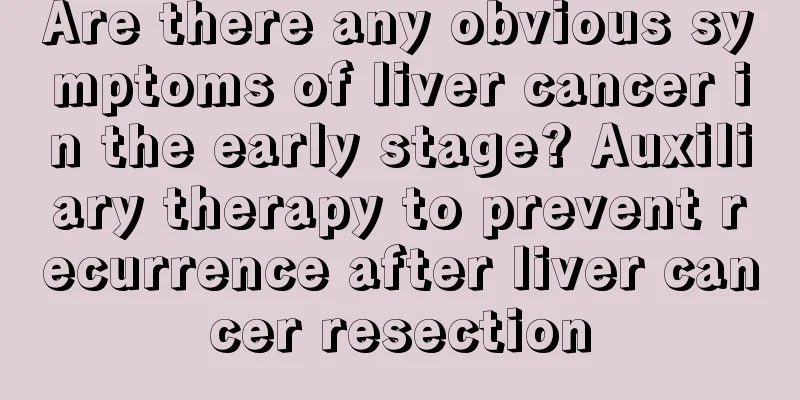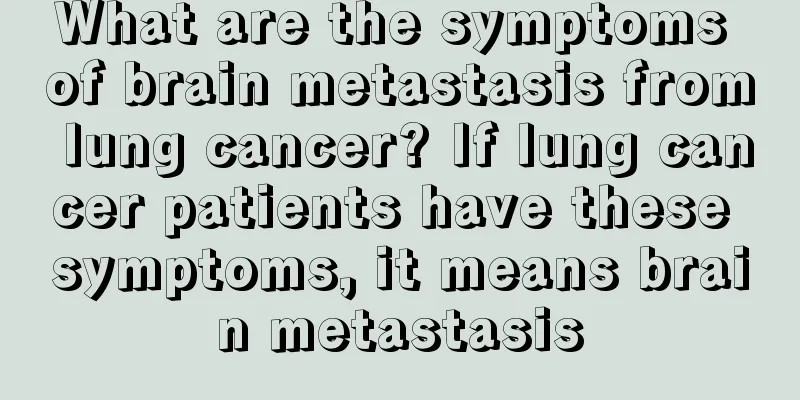Are there any obvious symptoms of liver cancer in the early stage? Auxiliary therapy to prevent recurrence after liver cancer resection

|
Adjuvant therapy to prevent recurrence after hepatocellular carcinoma resection The main means of treating liver cancer is surgery, but even with radical resection, more than half of the patients can suffer from cumulative recurrence within 5 years. Therefore, adjuvant therapy to prevent recurrence of liver cancer is very important. The purpose of adjuvant therapy after liver cancer surgery is to reduce the risk of postoperative recurrence. Currently, commonly used methods are hepatic artery embolization chemotherapy and the use of interferon. Hepatic arterial chemoembolization The commonly used auxiliary treatment method after liver cancer surgery is hepatic artery embolization chemotherapy. However, hepatic artery embolization chemotherapy has a disadvantage, that is, it has a certain damage to liver function. Therefore, there has been controversy in China as to whether this treatment method should be used after radical liver cancer surgery. However, there is a consensus that for patients with a high risk of postoperative recurrence, 1 to 2 hepatic artery embolization chemotherapy should be performed. If it is a small liver cancer with a single nodule and no vascular invasion, there is no need for auxiliary hepatic artery embolization chemotherapy, especially for small liver cancers with severe cirrhosis. Hepatic artery embolization chemotherapy should be used with caution after surgery. Interferon Another auxiliary treatment method to prevent postoperative recurrence is the use of interferon. It has been proven that interferon can reduce the recurrence rate of liver cancer after surgery, and the adverse reactions of interferon are relatively small. Most patients can tolerate it and it usually takes 1 to 2 years to use. With the continuous progress of research, if there is a protein called p48 positive in the liver cancer specimens removed after surgery, the application effect will be better. Are there any obvious symptoms in the early stages of liver cancer? There are no obvious symptoms in the early stage of liver cancer. Generally, when it is discovered more obviously, it is in the late stage, and the treatment is more difficult. Therefore, liver cancer must be treated early. At present, there are many methods for treating liver cancer clinically, and their indications are different, and the effects are also very different. The specific treatment methods are introduced as follows: 1. Liver transplant surgery 2. Liver resection surgery Liver resection surgery is a radical treatment for liver cancer patients by Navy hepatobiliary experts. It is still the preferred method for curing early and middle-stage liver cancer in the medical field, both in the past and now. Liver resection surgery is based on the patient's best prognosis. During the operation, necrotic and cancerous tumors in the liver are accurately removed, while minimizing the patient's trauma. The Navy's hepatobiliary surgery department's authoritative liver resection technology has incomparable advantages, including less trauma to patients, complete tumor resection, fast recovery, and fewer postoperative complications. 3. Radiofrequency ablation technology Radiofrequency ablation is an advanced technology that integrates human and machine operation. It accurately locates the local cancerous cells and causes coagulative necrosis to block the spread of liver cancer cells. It is an interventional technology that causes little damage to other liver tissues and adjacent tissues. Therefore, it is more suitable for patients with small liver cancer and multiple liver cancers. The intraoperative trauma is small and the recovery is fast. After the operation, the patient strictly follows the doctor's instructions and observes for a period of time before being discharged from the hospital. This method reduces the pain of liver cancer patients and allows them to return to normal life in a short time. 4. Cellular Immunotherapy Liver cancer can be treated with cellular immunotherapy, which can stimulate the body's own immune system to inhibit and treat tumors. It can make up for the shortcomings of traditional surgery, radiotherapy and chemotherapy. While killing tumor cells, it regulates and restores the body's immune function, kills formed tumor cells, inhibits the formation of new tumor cells, and blocks the source of tumor recurrence and metastasis. It is the best way to treat liver cancer. 5. Radiotherapy and chemotherapy Radiotherapy is also effective in treating liver cancer. It has begun to reduce the size of the tumor to a certain extent and can alleviate the symptoms of pain. However, radiotherapy and chemotherapy are also very harmful to patients, suppressing the body's immunity and causing damage to human functions. In clinical practice, it is often combined with cellular immunotherapy for comprehensive treatment. 6. Interventional treatment It includes transcatheter arterial chemotherapy (HAI), transcatheter arterial embolization (HAE) and transcatheter embolization (TACE). Simply giving transcatheter arterial chemotherapy is not enough. Transcatheter embolization is currently the most important interventional treatment method. Indications: Patients with advanced primary liver cancer who cannot be surgically removed, and patients who can be surgically removed but cannot or are unwilling to undergo surgery due to other reasons (such as advanced age, severe liver cirrhosis, etc.). For the above patients, radiological interventional therapy can be used as the first choice of non-surgical treatment. 7. Ablation therapy It refers to a type of treatment method that directly kills tumors locally under the guidance of imaging technology. Currently, radiofrequency and microwave ablation and anhydrous alcohol injection are the most commonly used. Indications: For single tumors with a diameter of ≤5cm or multiple nodules within 3 with a maximum diameter of ≤3cm, without blood vessel or bile duct invasion or distant metastasis, and early liver cancer patients with liver function of Child-Pugh A or B, radiofrequency or microwave ablation is the best choice other than surgery. 8. Biological therapy and molecular targeted therapy At present, most biological treatment methods or technologies are still in the stage of research and development and clinical trials, and a small part has been applied in clinical practice. In recent years, molecular targeted drugs for the treatment of liver cancer have become a new research hotspot and have received great attention. They mainly include: anti-EGFR drugs. 9. Traditional Chinese Medicine Treatment It is currently believed that traditional Chinese medicine can be used as an adjuvant treatment for liver cancer, helping to reduce the toxicity of radio and chemotherapy, improving cancer-related symptoms, improving the quality of life, and potentially prolonging survival. |
<<: Is lung cancer hereditary? What is the best way to treat advanced lung cancer?
>>: What are the causes of non-small cell lung cancer? What are the serious types of lung cancer?
Recommend
How to recover quickly after a hand contusion
In our lives, our hands help us solve many proble...
Which time period should be paid attention to in lung cancer treatment? Matters needing attention in lung cancer treatment
Lung cancer is a very common lung disease. This t...
Symptoms of neck muscle strain, early treatment when symptoms are discovered
Muscle strain is very common among people nowaday...
What should I do if I have yellow spots in my eyes?
If you have yellow spots in your eyes, you must p...
Epoxybenzopyrene
There are many things in life that we don’t under...
The efficacy and function of crisp pear
Crisp pear, a fruit we often eat. Perhaps you don...
How to avoid sequelae after cervical spondylosis surgery?
Due to high-intensity work and social pressure, m...
Will eating two eggs in the morning make you fat?
Eggs are a very common food in daily life. They a...
Can I have a baby after bowel cancer is cured
Colon cancer is a problem for many people and may...
What are the nursing measures for teratoma
Teratoma is generally a benign tumor, and surgica...
Will synovitis heal on its own?
Synovitis is a very common joint disease. Once th...
Acupuncture points for treating cervical vertebra, five major acupuncture points have good effects
Acupoint massage is very effective in treating ce...
Applying moxa ash on the face can reduce inflammation
In summer, because mosquito bites are particularl...
Low blood pressure strikes "sneakily", these symptoms are obvious at a glance
Hypotension, in contrast to hypertension, refers ...
Chickenpox disinfection method
Everyone knows that chickenpox is a disease cause...









